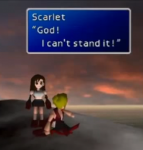Eerie
Fire and Blood
Aerith swearing is just as off-putting given what she says in JP though. She *never* swears in the JP, or is sassy how she is in English. She talks a lot more like a little kid. So it's just more of the same stretching of the characterization to fit what different fans want out of their characters.
And one of the things the English fanbase wants is more trash-talking out of the girls so the localizers have them trash-talk more.
Also, ToTP *did* confirm there's some kind of religion that uses judeo-christian terms for what is in it... so "oh my god" would fit the setting now....
That's true for Aerith swearing and sounding more childish in JP and other languages, I'm not fan of the swearing actually. And I think that Intermission really threw off people who played in English because you can see Aerith's true way of speaking there, as there was no way to turn her lines with sassiness.
As for the religion, sure but... Tifa isn't religious, she hasn't got any religious background (that's why I said I could see Aerith saying it, but not Tifa). When religion is not a thing, these kind of terms just... don't exist. At all. Because what is "god"? The answer is they don't know. Especially not Tifa, we see it with her mum's death and what she thought about it. If she had known or believed about a god, she'd have mentioned it there. To me it's jarring because it should not be there. Yes, I understand it's innocuous, but the translators forgot that there is no god in FFVII.
Also, I want to add a little bit of context because the translator gushes a lot about English being more natural than the Japanese; having talked to Peko, who is native, the dialogues are natural in Japanese too - as they are in French, and I suppose in Italian and German. That's the thing that kind of grates me, when someone says "oh it doesn't sound natural in xx language" just because the English is *heavily* localised. Because it is natural. But of course when you have to translate, it sounds weird. Because there are things in Japanese that cannot be translated but that give life to characters (thinking about Reno's speech for example), so other languages have to rely on other things to fully convey the characterisation.



